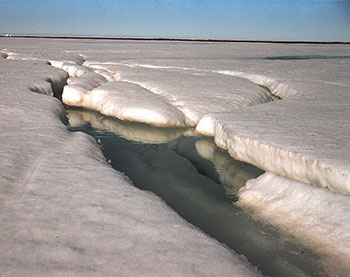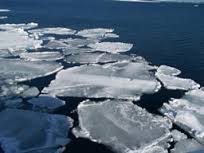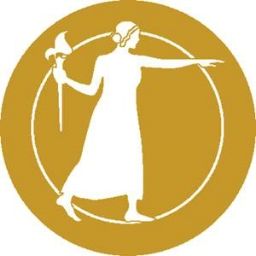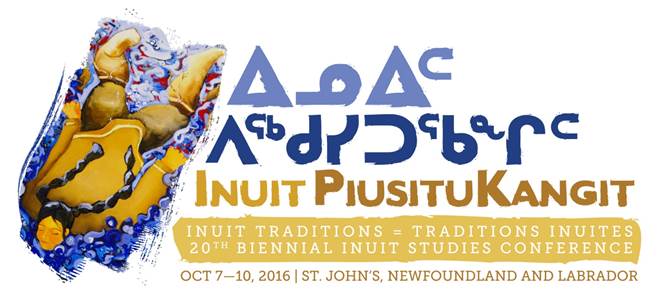|
|
|
|
|
|
|
|
Conference on Water Innovations for Healthy Arctic Homes: September 18-21, 2016, Anchorage, Alaska. This circumpolar conference will bring together engineers, health experts, researchers, community members, policymakers, and innovators to discuss health benefits, challenges and innovations associated with making running water and sewer in remote northern communities safe, affordable and sustainable. Information and an expression of interest in attending can be found here. (The full link is: http://wihah2016.com/)
13th International Conference on Gas in Marine Sediments: September 19-22, 2016 (Tromso, Norway). GIMS 13 promotes the study of natural gas and release systems on a global scale and facilitates interdisciplinary and international cooperation. The conference intends to bring together geologists, biologists, microbiologist, geophysicists, oceanographers, geochemists and scientists from modeling disciplines. The forum will provide a platform for current knowledge and future programs in gas inventories, fluxes and their role within the carbon cycle and biodiversity. Conference is organized by CAGE - Centre for Arctic Gas Hydrate, Environment and Climate at UiT The Arctic University of Norway. Abstract submission deadline is May 30th and registration deadline is June 20th. For more information: http://gims13.uit.no
Today's Congressional Action:
The House is expected to consider non-legislative legislative provisions. The Senate is expected to consider a short-term continue resolution to continue to fund government operations after September 30, 2016.
|
Media
Paris Climate Deal Moves Closer to Taking Force. The United Nations took a big step toward entering the Paris climate change agreement into force Wednesday when 31 countries submitted ratification paperwork. Representatives of the countries submitted their ratifications at a ceremony during the U.N. General Assembly Wednesday morning, bringing the total ratifying countries to 60. The agreement has now surpassed the 55-country threshold it needs to take force. But the countries together represent only 48 percent of the world's carbon dioxide emissions, according to the World Resources Institute - short of the 55 percent threshold that is also necessary. The Hill
Russia's Northern, Pacific Fleets Participate in Arctic Region Tactical Drills. Warships from Russia's Northern and Pacific Fleets took part in tactical naval drills in the Arctic region, near the New Siberian Islands, a spokesman for the Russian Navy said Wednesday. Russia has been stepping up its military, trade and exploration activities in the Arctic region. It has been building transport and energy production infrastructure, as well as installing military facilities and developing the Northern Sea Route linking Europe to Asia. Sputnik News
 Arctic Sea Ice Annual Minimum Ties Second Lowest on Record. Arctic Sea Ice Annual Minimum Ties Second Lowest on Record. Arctic sea ice appeared to have reached its annual lowest extent on Sept. 10, NASA and the NASA-supported National Snow and Ice Data Center (NSIDC) at the University of Colorado at Boulder reported Monday. An analysis of satellite data showed that at 1.60 million square miles (4.14 million square kilometers), the 2016 Arctic sea ice minimum extent is effectively tied with 2007 for the second lowest yearly minimum in the satellite record. Since satellites began monitoring sea ice in 1978, researchers have observed a steep decline in the average extent of Arctic sea ice for every month of the year. Space Daily
How to Create Policy-Relevant Research for a Sustainable Arctic Future. On September 28, the White House will host science ministers and representatives from indigenous groups to reflect on Arctic science, monitoring and data sharing. Ross A. Virginia and Michael Sfraga offer their view on the advancement of scientific study in the region. Pick up any major news publication and it will likely include an article about the rapid, profound and accelerating changes we see in the Arctic. The influence of melting glaciers, declining sea ice and rising sea levels now reach beyond the Arctic and are recognized as global issues requiring international action. News Deeply  The Difficulty of Predicting an Ice-Free Arctic. The Difficulty of Predicting an Ice-Free Arctic. The Arctic is nearing its seasonal sea ice minimum this month, but predicting exactly when the region will see its first ice-free summer may be more difficult than previously believed, according to the results of new University of Colorado Boulder research. After examining both high- and medium-level carbon dioxide emission modeling scenarios for the rest of the 21st century, the study found that it is not possible to reduce the uncertainty window for an ice-free Arctic to a period of less than 21 years due to the inherently chaotic nature of the climate. Science Daily
|
Legislative Action.gif)
No Arctic legislation was formally considered yesterday.
|
|
Future Events
Bridging the Future of Arctic Social Science Research, September 23-24, 2016 (Monticello, Virginia, USA). The event is sponsored by Arctic Horizons. The event will reassemble the members of the National Steering Committee and a small but diverse selection of representatives from the five regional workshops, to total about 15 people. The aim will be to identify and synthesize the core threads of the previous workshops and public contributions proffered between workshops. The target output for the workshop will be a final report draft and outline of steps leading to the final report release in June 2016. The Jefferson Institute will manage production of the publication.
The event will be a dialogue on one of the four themes of the ministerial: "Arctic Science as a Vehicle for STEM Education and Citizen Empowerment." The event also provides an opportunity to hear from ministerial participants before the closed meetings of the ministerial begin the next day.
Two 1-hour panel discussions by an international group of Arctic leaders, including USARC Chair Fran Ulmer, will explore opportunities for advancing the use of Arctic research and education activities to inform worldwide audiences about the changes happening in the Arctic and to help empower Arctic residents most impacted by the complex dynamics shaping the region. An introductory plenary by Mark Brzezinski, Executive Director of the U.S. Government's Arctic Executive Steering Committee will kick-off the conversation.
Second International Conference on Natural Resources and Integrated Development of Coastal Areas in the Arctic Zone, September 27-29, 2016 (Arkhangelsk, Russia). The Conference is organized by FASO of Russia, Russian Academy of Sciences, Government of Arkhangelsk region, Arkhangelsk Scientific Center and International Arctic Science Committee (IASC). Conference is aimed at elaboration of research-based practical measures and instruments for realization of human, natural and transport-logistical potential of the Arctic zone, including development of the Northern Sea Route and implementation of models of integrated coastal areas management. For additional information, please email.
National Academies of Sciences..."Scientific Priorities for a Changing Arctic(panel discussion)," September 29, 4:00 to 6:30pm (Washington, DC. The public is invited to a recap and discussion of the first-ever White House Arctic Science Ministerial taking place, in Washington, DC, on September 28. At that event, ministers of science, chief science advisors, and other senior officials from countries around the world, as well as representatives from indigenous groups, will address the collective actions and innovative collaborations
 needed to enhance scientific understanding of the rapidly changing Arctic. This Academies' event and reception provides an opportunity to broaden the conversation to all those interested in the Arctic science and policy. Panelists will include officials from the White House, from the USARC, and others involved in the ministerial discussions. needed to enhance scientific understanding of the rapidly changing Arctic. This Academies' event and reception provides an opportunity to broaden the conversation to all those interested in the Arctic science and policy. Panelists will include officials from the White House, from the USARC, and others involved in the ministerial discussions.
As an exciting cultural addition to the program, producers of a new large format 3D film about Greenland will share their storytelling strategies and the process of using immersive cinema, virtual reality and the perspectives of climate scientists and  extreme athletes to expand public understanding of the Arctic environment. Presenters will represent producing partners Giant Screen Films, Teton Gravity Research, and Golden Gate 3D. Support for this event is provided by USARC and the National Academies of Sciences, Engineering, and Medicine. Please register
Arctic Economic Council: Building the Bridge Between Arctic Research/ Academia and Business Through Technology, September 29, 2016 (Washington, DC USA). This Arctic Science Ministerial side event, sponsored by the Arctic Economic Council, will explore value propositions for public-private partnerships for effective pan-Arctic knowledge and data exchange. Industry, research and technology experts will convene at the Embassy of Finland to address challenges and innovative tools for building the knowledge bridge between research and business communities. 9:30 am to 11:15 am at 3301 Mass. Ave., NW. Doors open at 9:00 am. Space is limited and RSVP is required for security purposes. Please RSVP by September 26 to anu@arcticeconomiccouncil.com
Media Coverage in the Arctic: News from the North: What's Happening in the Arctic is no Longer Staying in the Arctic, September 29, 2016 (Washington, DC USA). High North News will host on Capitol Hill, a lunchtime discussion on media coverage of the Arctic. The luncheon begins at 12:30 pm, at the Oracle Townhouse, 27 D Street, SE, Washington, DC. RSVP is required, contact Berit Enge (berit.enge@highnorthnews.com)
106th Commission Meeting of the US Arctic Research Commission. September 29-30, 2016 (Washington, DC USA). The U.S. Arctic Research Commission will hold its 106th meeting in Washington, DC, on September 29-30, 2016. The business sessions, open to the public, will convene at 8:30 a.m. at the U.S. Global Change Research Program, 1800 G St. NW., #9100, Conf. Rm. A, Washington, DC 20006. The focus of this meeting will include reports and updates on programs and research projects affecting Alaska and the greater Arctic.
 The daylong conference at the University of Southern Maine will address challenges and opportunities for Arctic science, business, shipping, security and governance. Speakers will include Sen. Angus S. King (I-Maine) and co-chair of U.S. Senate Arctic Caucus (Invited); Craig Fleener, Special Asst. on Arctic Policy, State of Alaska, Prof. Charles Norchi, Dir. Center for Oceans and Coastal Law, Univ. of Maine School of Law, Ambassador David Balton, Chair of the Senior Arctic Officials and Tara Sweeney, Arctic Economic Council Chair and Executive Vice President, External Affairs, Arctic Slope Regional Corporation. Event sponsored by Pierce Atwood LLP and Univ. of Southern Maine on behalf of the Maine and Alaska Arctic Council Host Committees. The daylong conference at the University of Southern Maine will address challenges and opportunities for Arctic science, business, shipping, security and governance. Speakers will include Sen. Angus S. King (I-Maine) and co-chair of U.S. Senate Arctic Caucus (Invited); Craig Fleener, Special Asst. on Arctic Policy, State of Alaska, Prof. Charles Norchi, Dir. Center for Oceans and Coastal Law, Univ. of Maine School of Law, Ambassador David Balton, Chair of the Senior Arctic Officials and Tara Sweeney, Arctic Economic Council Chair and Executive Vice President, External Affairs, Arctic Slope Regional Corporation. Event sponsored by Pierce Atwood LLP and Univ. of Southern Maine on behalf of the Maine and Alaska Arctic Council Host Committees.
Arctic Ambitions V: International Business Conference & Trade Show, October 4-5, 2016 (Anchorage, Alaska, USA). This once-a-year event uniquely focuses on business and investment opportunities flowing from developments in the Arctic. With interest in commercial development in the Arctic growing rapidly, WTC Anchorage initiated the Arctic Ambitions conference five years ago to address issues such as innovation, investment, infrastructure development, transportation, natural resources, and trade. At the event, corporate executives and senior government officials from across the Arctic, and around the world, make presentations and participate in panel discussions. This year's conference also includes a Trade Show and B2B Matchmaking Session. For more information, please contact Greg Wolf ( greg@wtcak.org) or call 907-278-7233.
56th Annual Air & Waste Management Association Conference October 5-7, 2016 (Juneau, AK USA). Come join us at the Pacific Northwest International Section's (PNWIS) annual conference in Juneau and connect with many of the region's top environmental professionals. Catch up on the latest developments in arctic related regulatory policy and law, environmental science and technology, environmental modeling, and other topics over three days of parallel technical sessions. PNWIS is a catalyst for environmental leadership by providing a neutral forum for discussion, education, and networking on technical issues relating to environmental management in the U.S., Alaska, the Pacific Northwest and Western Canada. Exhibitor booths will be on display and you can attend a keynote speech by the Deputy Commissioner of the AK Department of Environmental Conservation, Alice Edwards.
 20th Biennial Inuit Studies Conference: Inuit Traditions. October 7-10, 2016 (St. Johns, Newfoundland and Labrador). Inuit traditions are a repository of Inuit culture and a primary expression of Inuit identity. The theme for the 2016 Inuit Studies Conference invites Elders, knowledge-bearers, researchers, artists, policy-makers, students and others to engage in conversations about the many ways in which traditions shape understanding, while registering social and cultural change. The institutional hosts of "Inuit Traditions," Memorial University of Newfoundland and the Nunatsiavut Government, invite you to contribute to an exchange of knowledge to be held in St. John's, Newfoundland and Labrador, October 7-10, 2016. Presentations on all aspects of Inuit studies will be welcome.
Arctic Circle Assembly. October 7-9, 2016 (Reykjavik, Iceland). The Arctic Circle is the largest network of international dialogue and cooperation on the future of the Arctic. It is an open democratic platform with participation from governments, organizations, corporations, universities, think tanks, environmental associations, indigenous communities, concerned citizens, and others interested in the development of the Arctic and its consequences for the future of the globe. It is a nonprofit and nonpartisan organization.In addition to the annual Assemblies, the Arctic Circle organizes Forums on specific areas of Arctic cooperation.
Arctic Technology Conference, October 24-26, 2016 (St. John's, Canada). Founded in 1969, the Offshore Technology Conference (OTC) is the world's foremost event for the development of offshore resources in the fields of drilling, exploration, production and environmental protection. The Arctic Technology Conference (ATC) is built upon OTC's successful multidisciplinary approach, with 14 technical societies and organizations working together to deliver the world's most comprehensive Arctic event.
Fulbright Arctic Week. October 25-27 (Washington, DC) The 18-month Fulbright Arctic Initiative supports U.S. priorities on Arctic issues and increasing mutual understanding between Americans and those in other countries. As a culmination of the program, 17 scholars will be presenting their work at public events. Other invited speakers will include officials from the Inuit Circumpolar Council, Arctic Executive Steering Committee, and U.S. Arctic Youth Ambassadors, among other. For more information, please visit the Fulbright Arctic Week website and/or register your interest for updates.
October 25, 2-5:30pm - Smithsonian Natural History Museum
October 26, 2-5pm - Arctic Policy Dialogue at the Carnegie Endowment for International Peace
October 27, 9am-4:30pm - Fulbright Arctic Symposium at the National Academy of Sciences (Constitution Ave. location)
Towing Safety Advisory Committee, October 2016 Meeting, October 26-27, 2016 (Washington, DC USA). The Towing Safety Advisory Committee will meet in Washington, DC, to review and discuss recommendations from its Subcommittees and to receive briefs. This committee is established in accordance with, and operates under the provisions of, the Federal Advisory Committee Act. As stated in 33 U.S.C. 1231a, the Towing Safety Advisory Committee provides advice and recommendations to the Department of Homeland Security on matters relating to shallow-draft inland and coastal waterway navigation and towing safety.
Annual Scientific Meeting 2016, December 5-9, 2016 (Winnipeg, MP Canada). ArcticNet will host its 12th Annual Scientific Meeting. The ASM2016 will welcome researchers, students, Inuit, Northerners, policy makers and stakeholders to address the numerous environmental, social, economical and political challenges and opportunities that are emerging from climate change and modernization in the Arctic. As the largest annual Arctic research gathering held in Canada, ArcticNet's ASM is the ideal venue to showcase results from all fields of Arctic research, stimulate discussion and foster collaborations among those with a vested interest in the Arctic and its peoples.
POLAR 2018, June 15-27, 2018 (Davos, Switzerland). POLAR2018 is a joint event from the Scientific Committee on Antarctic Research (SCAR) and the International Arctic Science Committee (IASC). The SCAR meetings, the ASSW and the Open Science Conference will be hosted by the Swiss Federal Institute for Forest, Snow and Landscape Research WSL under the patronage of the Swiss Committee on Polar and High Altitude Research. The WSL Institute for Snow and Avalanche Research SLF is organizing POLAR2018.
|
|

  
4350 N. Fairfax Drive, Suite 510
Arlington, VA 22203, USA
External links in this publication, and on the USARC's World Wide Web site ( www.arctic.gov) do not constitute endorsement by the US Arctic Research Commission of external Web sites or the information, products or services contained therein. For other than authorized activities, the USARC does not exercise any editorial control over the information you may find at these locations. These links are provided consistent with the stated purpose of this newsletter and the USARC Web site.
|
|
|
|
|
|
|
|
|